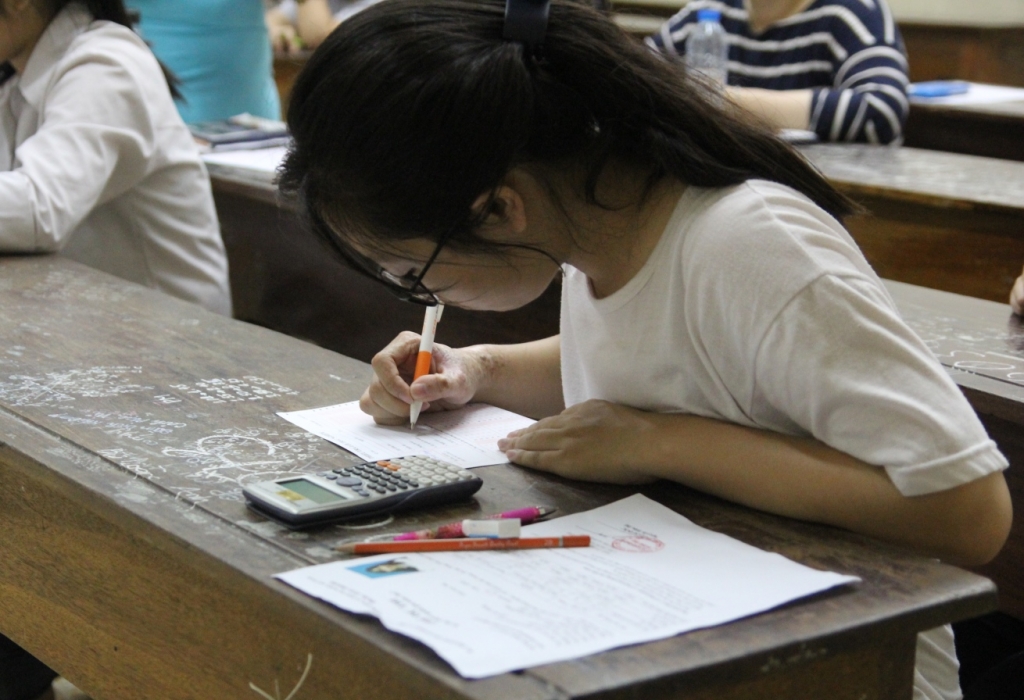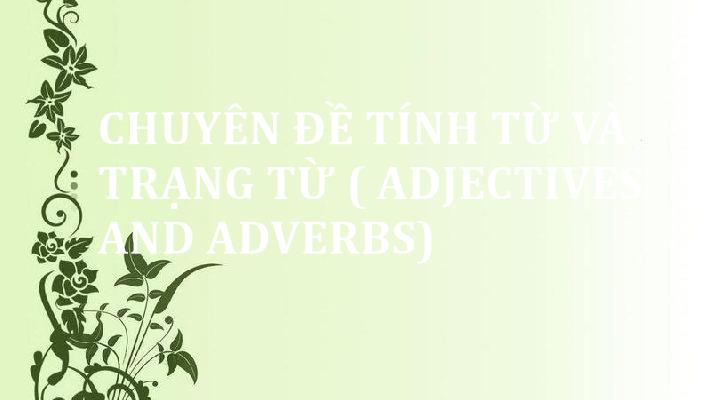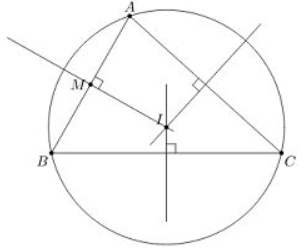I. THEORY (LÝ THUYẾT)
1. Uses (cách dùng)
+) Diễn tả 1 sự việc, 1 thói quen lặp đi lặp lại ở hiện tại. Thường đi với các trạng từ tần suất như: always, usually, often, sometimes, occasionally, rarely/seldom, ever, never…và 1 số trạng từ khác như: every ( day, week…), once a week, twice/ three times...
Eg: Everyday, I go to school by bike.
We usually have math on Mondays.
- Trạng từ tần suất thường đứng trước động từ thường, sau "to be" hoặc sau trợ động từ.
+) Diễn tả 1 sự thực có tính ổn định lâu dài ở hiện tại.
Eg : She is a doctor.
I live in Hanoi city.
+) Diễn tả 1 chân lý, quy luật tự nhiên, luôn đúng tại mọi thời điểm.
Eg: Bees make honey.
The sun rises in the East and sets in the West.
No one is perfect.
+) Diễn tả 1 hành động xảy ra trong tương lai nhưng đã được đưa vào chương trình kế hoạch cố định (giờ tàu xe chạy, lịch trình chuyến đi…)
Eg: The concert starts at 8 p.m.
The last train leaves the station at 11 p.m.
+) Ngoài ra, thì hiện tại đơn còn được dùng để nói về khả năng ở hiện tại, chỉ sở hữu, buổi tường thuật trực tiếp hay tựa đề báo chí, mệnh đề thời gian trong tương lai, mệnh đề “if” trong câu điều kiện loại I.
Eg: I can speak English.
I have a pen.
2. Forms (cấu trúc)
a, Đối với “to be”
Khẳng định : (+) I + am
We/you/they ( số nhiều) + are
He/she/it ( số ít ) + is
Phủ định : (-) S + am/is/are + not +…..N/adj
( is not = isn’t , are not = aren’t)
Nghi vấn : (?) yes/no: Am/is/are + S + N/adj….?
Yes, S + be
No, S + be + not.
Wh-qs ( câu hỏi lấy thông tin)
Wh + be + S +….?
Eg: (+) She is a teacher.
(-) She isn’t a teacher.
(?) Is she a teacher?
What is she? What is her job?
Eg: (+) I am kind.
(-) I am not kind.
(?) Are you kind?
How are you?
b, Đối với “to do” ( động từ thường chỉ hành động)
(+) S1 ( I, we, you, they) +V....
S2 ( he/she/it) + * Vs ( thông thường)
* Ves ( tận cùng là o,s,sh,ch,x,z)
Phụ âm +y → ies
Eg: study → studies
go → goes, watch → watches
(-) S1 + do + not → don’t + V….
S2 + does + not → doesn’t + V +…
(?) Do / does + S + V…?
Yes, S + do / does No, S + don’t / doesn’t
(?) wh + do / does + S + V…..
- chú ý: nếu thành phần để hỏi là chủ ngữ thì trật tự như câu khẳng định.
Eg: (+) I work in the company.
(-) I don’t work in the company
(?) Do you work in the company?
What do you do?
Where do you work?
c, Đối với modal verb ( Động từ khuyết thiếu)
can: có thể
may: có thể
must : phải
have to: phải
should : nên
cấu trúc chung: (+) S + modal V + V…
(-) S + modal V + not + V…
(?) modal V + S + V…
wh + modal V + S + V…
• trường hợp đặc biệt: have to
(+) S + have to / has to + V
(-) S + don’t / doesn’t + have to +V
(?) Do / does + S + have to?
Wh + do / does + S + have to + V?
Eg: (+) My mother can cook very well.
(-) My mother can not cook very well.
(?) Can your mother cook well?
How can your mother cook?
Eg2: (+) I have to do my homework every day.
(-) I don’t have to do my homework every day.
(?) Do you have to do your homework every day?
What do you have to do everyday?
II. BÀI TẬP
Bài 1: Chuyển các câu sau sang phủ định và nghi vấn:
1. I often get up at 6 a.m.
(-)
(?)
(?)
2. He studies very hard.
(-)
(?)
(?)
3. My sister is a student.
(-)
(?)
(?)
4. They go to the dentist twice a month.
(-)
(?)
(?)
5. She can dance gracefully.
(-)
(?)
(?)
Bài 2: Điền dạng đúng của động từ trong ngoặc ở thì hiện tại đơn:
1. Every morning, she ( get) up , ( brush) her teeth, ( wash) her face, ( have) breakfast and ( go) to school.
2. My father usually ( watch) TV in the morning.
3. your mother ( be ) a doctor?
4. Where you ( be) ?
→ I ( be) at home.
5. They ( not speak) English well.
6. I (not have) much money, so sometimes my father ( give) me some.
7. Where your friend ( live) and ( work)?
→ He ( live) and ( work) in HCM city.
8. She ( not have) a nice house because she ( be) very poor.
9. I ( be) used to getting up late.
10. These ( be) bananas and apples. Which you ( prefer)?
Đáp án:
Bài 1:
1. I often get up at 6 a.m.
(-) I don't often get up at 6 a.m.
(?) Do you often get up at 6 a.m?
(?) What time do you often get up?
2. He studies very hard.
(-) He doesn't study hard.
(?) Does he study hard?
(?) How does he study?
3. My sister is a student.
(-) My sister isn't a student.
(?) Is your sister a student?
(?) What does your sister do?
4. They go to the dentist twice a month.
(-) They don't go to the dentist twice a month.
(?) Do they go to the dentist twice a month?
(?) How often do they go to the dentist?
5. She can dance gracefully.
(-) She can't dance gracefully.
(?) Can she dance gracefully?
(?) How can she dance?
Bài 2:
1. Every morning, she ( get) up , ( brush) her teeth, ( wash) her face, ( have) breakfast and ( go) to school.
gets brushes washes has goes
2. My father usually ( watch) TV in the morning.
watches
3. Your mother ( be ) a doctor?
Is your mother a doctor?
4. Where you ( be) ?
Where are you?
→ I ( be) at home.
am
5. They ( not speak) English well.
don’t speak
6. I (not have) much money, so sometimes my father ( give) me some.
don’t have gives
7. Where your friend ( live) and ( work)?
Where does your friend live and work?
→ He ( live) and ( work) in HCM city.
lives works
8. She ( not have) a nice house because she ( be) very poor.
doesn’t have is
9. I ( be) used to getting up late.
am
10. These ( be) bananas and apples. Which you ( prefer)?
are do you prefer







